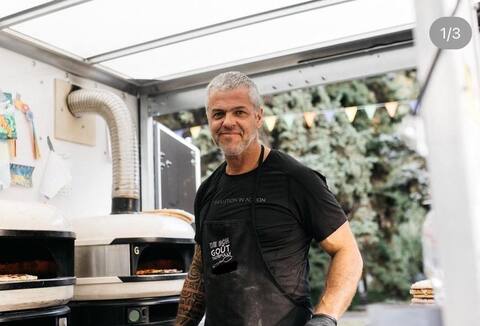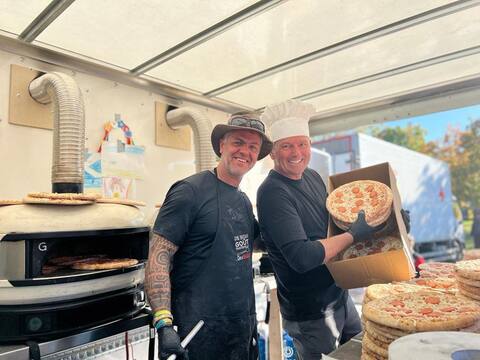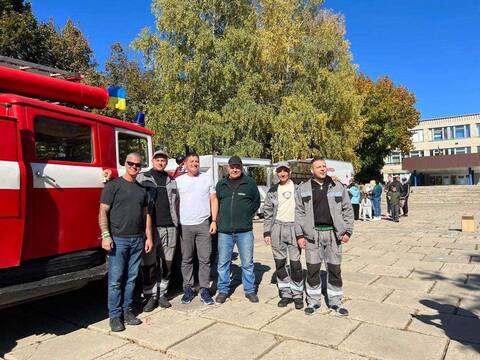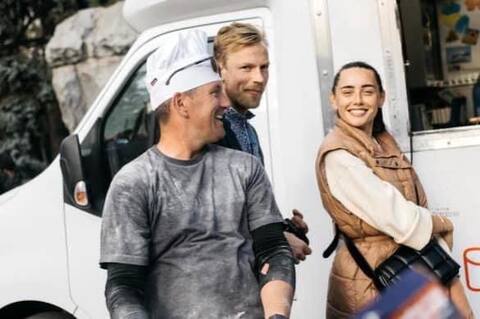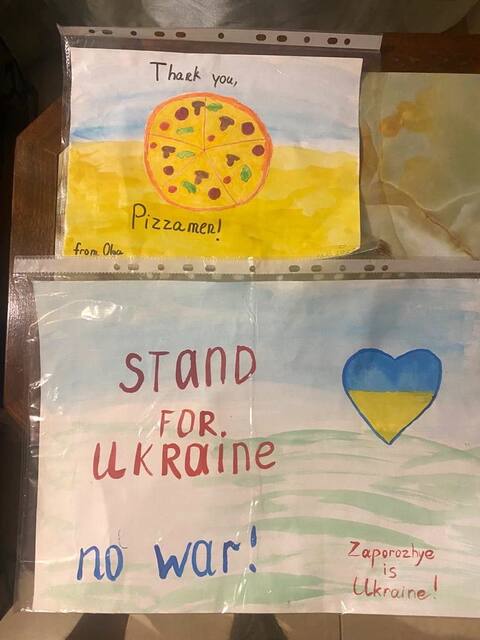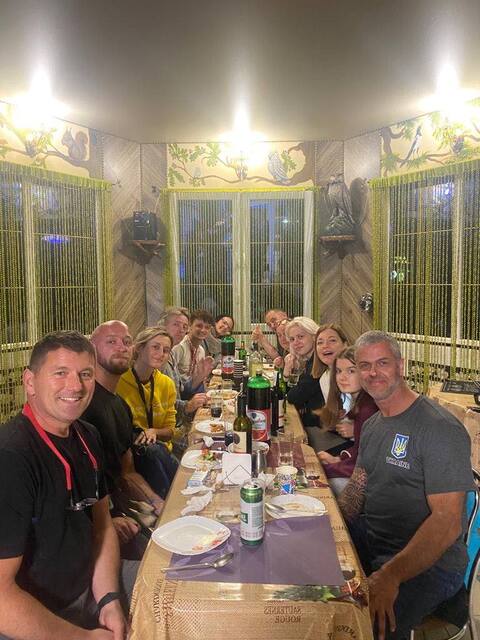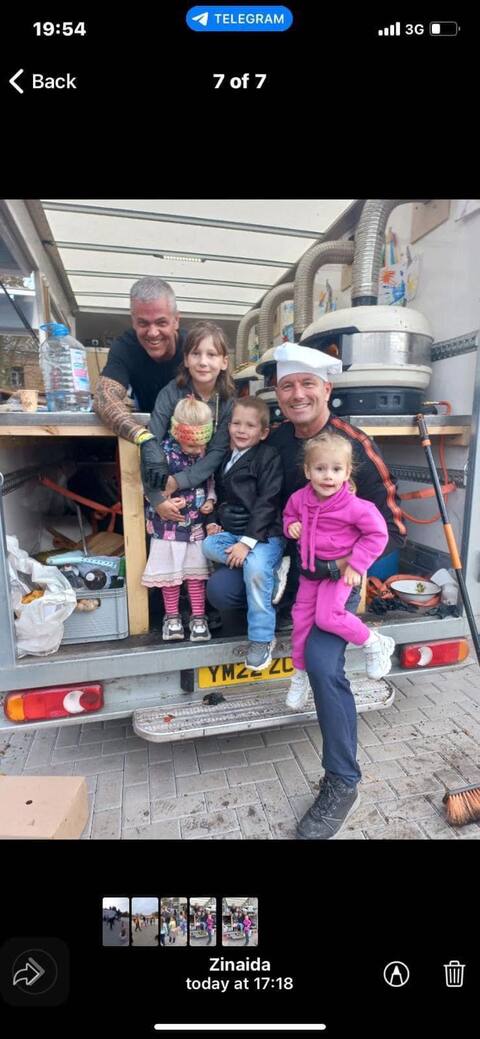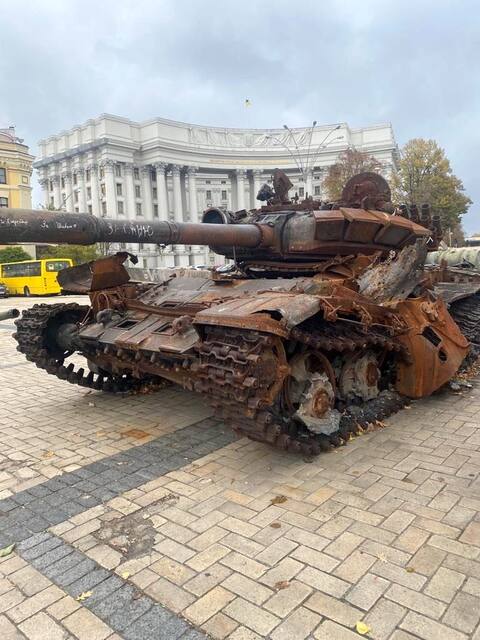Six months after a first mission on the Polish border, a Quebec firefighter took another crack at humanitarian action across Ukraine to recently liberated cities, where he saw the resilience of people unwilling to give up. To the Russian invader.
Montreal firefighter Serge Fournier, who has seven deployments to Haiti, was with Jocelyn Richer, chief of technical support operations for the Plainville Fire Department.
“When I asked him if he wanted to come with me he didn’t hesitate, he invested a lot of time to come,” said Mr. Fournier reveals.
The latter has changed colleagues over the past six months, exchanging enough working hours for three weeks.
From October 3rd to 23rd, the two Quebecers volunteered to help the Scottish charity Siobhan Foundation. Under the slogan “Make pizza, not war,” it serves Ukrainians hot meals from food trucks.
“Harry (Scrymgeour) is an art dealer who left his job to devote himself to this humanitarian cause. Apart from two refrigerated trucks, the foundation has six trucks,” says Serge Fournier.
He made a name for himself!
His involvement was so appreciated by the foundation that his most recent truck was named “The Surge,” a nod to the Quebecer’s first name.
“We distribute approximately 4,000-5,000 pizzas a day,” notes Mr. Fournier. “We don’t just give pizza, we give hope and joy to places without water or electricity where no international organization has gone before.”
“The face of war has changed since April,” said Mr. Richer noted that there are no refugees lining up at the Polish border to leave Ukraine.
Their first stop was the relatively innocuous city of Lviv in the northwest of the country. “People live there normally. They learn to live with it (the bombings), he explains.
Risks
The two firefighters quickly moved to eastern Ukraine, where the fighting was fierce. A 15-hour drive to deliver pizzas in 17 cities.
“The roads are very dangerous. We were driving at night. Checkpoints are numerous and poorly lit. There are sandbags or cement stones piled up on the side of the road and you have to be very alert,” he recalls.
“We went to recently liberated cities like Kharkiv and Izium. Kharkiv (less than 30 km from the Russian border) has no running water or electricity. There is a lot of destruction. We saw people standing in queues with their hands dirty,” he said.
They soon see the hell that Ukrainians have lived through. Buildings lie in ruins, destroyed military and civilian vehicles litter the landscape, scattered with fragments from bombs.
Explosions
But the direct connection with the Battle of Quebecers probably took place in Zaporizhia. The city of 800,000 people is still under Ukrainian control. But the front line is about 20 km.
The region (oblast) is also known as Zaporizhzhya, most of which is under Russian control. It is in this territory controlled by the invader that the Zaporizhzhya nuclear power plant – the largest in Europe – is located about fifty km from the city of the same name. Madly and recklessly, it was the target of numerous Russian bombings.
“We arrived in Zaporizhia in the dark. We don’t know what awaits us. The city got missiles in the morning and we could hear them at night. Many windows were broken in the buildings and there were bullet holes in the windows of the shops,” recalled Serge Fournier.
The hotel where they were staying also housed a group of foreign fighters who returned to the front every morning.
In combat or volunteers
Mr. Fournier Small also has precious memories of his encounters with firefighters.
“It’s a town of 12,000 people that operates a uranium mine. Their firefighters have gone to war, and all but four have voluntarily stayed because the town can’t pay anymore. I had a big crush on the people of Smolensk.
Arriving in the newly liberated areas, the aid workers initially showed great presence when distributing pizza, and elsewhere they did not hesitate to play music and create a festive atmosphere.
“We thought we would be more relaxed in these parts, but people wanted to think about something other than war, so they surprised us by wanting to dance.”
Valuable connections
For its work, the group was able to benefit from the help of many Ukrainians.
“Nina, a model, we were in contact with the police, who gave us access to the war zone. Anna and Valery were with us throughout the trip. During the distribution, many Ukrainians came to help us,” Mr. Fournier underlines.
These contacts with the Ukrainians made him aware of the root of the problem, Russian frustration at never being able to subdue the Ukrainians.
“Ukrainians are about 80% of Russians who agree with this war. Their hatred of Ukrainians goes back a long way to their refusal to accept communism under Stalin and their attachment to their land and what they own. They have already experienced other genocides, such as the Holomoder of 1933-34, during which four million Ukrainians died. Starved to death (by order of Stalin).
“I sincerely believe that Ukraine will win this war. After this three week trip I am sure of it. Their will and love for their country will make them succeed, but we must continue to support them,” concludes the brave firefighter.
***to focus***
Those interested in participating in the humanitarian caravan in Ukraine can contact Serge Fournier at fournierserge50@gmail.com.

